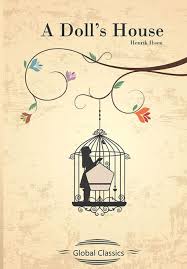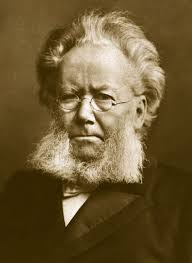A Doll's House Page #7
A Doll's House is a three-act play written by Henrik Ibsen. It premiered at the Royal Theatre in Copenhagen, Denmark, on 21 December 1879, having been published earlier that month. The play is set in the home of the Helmer family in an unspecified Norwegian town or city, circa 1879 and focuses on the awakening of a middle-class wife and mother.
Nora. But you must believe me, Mr. Krogstad; it is not in my power to help you at all. Krogstad. Then it is because you haven't the will; but I have means to compel you. Nora. You don't mean that you will tell my husband that I owe you money? Krogstad. Hm!--suppose I were to tell him? Nora. It would be perfectly infamous of you. (Sobbing.) To think of his learning my secret, which has been my joy and pride, in such an ugly, clumsy way--that he should learn it from you! And it would put me in a horribly disagreeable position-- Krogstad. Only disagreeable? Nora (impetuously). Well, do it, then!--and it will be the worse for you. My husband will see for himself what a blackguard you are, and you certainly won't keep your post then. Krogstad. I asked you if it was only a disagreeable scene at home that you were afraid of? Nora. If my husband does get to know of it, of course he will at once pay you what is still owing, and we shall have nothing more to do with you. Krogstad (coming a step nearer). Listen to me, Mrs. Helmer. Either you have a very bad memory or you know very little of business. I shall be obliged to remind you of a few details. Nora. What do you mean? Krogstad. When your husband was ill, you came to me to borrow two hundred and fifty pounds. Nora. I didn't know anyone else to go to. Krogstad. I promised to get you that amount-- Nora. Yes, and you did so. Krogstad. I promised to get you that amount, on certain conditions. Your mind was so taken up with your husband's illness, and you were so anxious to get the money for your journey, that you seem to have paid no attention to the conditions of our bargain. Therefore it will not be amiss if I remind you of them. Now, I promised to get the money on the security of a bond which I drew up. Nora. Yes, and which I signed. Krogstad. Good. But below your signature there were a few lines constituting your father a surety for the money; those lines your father should have signed. Nora. Should? He did sign them. Krogstad. I had left the date blank; that is to say, your father should himself have inserted the date on which he signed the paper. Do you remember that? Nora. Yes, I think I remember-- Krogstad. Then I gave you the bond to send by post to your father. Is that not so? Nora. Yes. Krogstad. And you naturally did so at once, because five or six days afterwards you brought me the bond with your father's signature. And then I gave you the money. Nora. Well, haven't I been paying it off regularly? Krogstad. Fairly so, yes. But--to come back to the matter in hand--that must have been a very trying time for you, Mrs. Helmer? Nora. It was, indeed. Krogstad. Your father was very ill, wasn't he? Nora. He was very near his end. Krogstad. And died soon afterwards? Nora. Yes. Krogstad. Tell me, Mrs. Helmer, can you by any chance remember what day your father died?--on what day of the month, I mean. Nora. Papa died on the 29th of September. Krogstad. That is correct; I have ascertained it for myself. And, as that is so, there is a discrepancy (taking a paper from his pocket) which I cannot account for. Nora. What discrepancy? I don't know-- Krogstad. The discrepancy consists, Mrs. Helmer, in the fact that your father signed this bond three days after his death. Nora. What do you mean? I don't understand-- Krogstad. Your father died on the 29th of September. But, look here; your father has dated his signature the 2nd of October. It is a discrepancy, isn't it? (NORA is silent.) Can you explain it to me? (NORA is still silent.) It is a remarkable thing, too, that the words "2nd of October," as well as the year, are not written in your father's handwriting but in one that I think I know. Well, of course it can be explained; your father may have forgotten to date his signature, and someone else may have dated it haphazard before they knew of his death. There is no harm in that. It all depends on the signature of the name; and that is genuine, I suppose, Mrs. Helmer? It was your father himself who signed his name here? Nora (after a short pause, throws her head up and looks defiantly at him). No, it was not. It was I that wrote papa's name. Krogstad. Are you aware that is a dangerous confession? Nora. In what way? You shall have your money soon. Krogstad. Let me ask you a question; why did you not send the paper to your father? Nora. It was impossible; papa was so ill. If I had asked him for his signature, I should have had to tell him what the money was to be used for; and when he was so ill himself I couldn't tell him that my husband's life was in danger--it was impossible. Krogstad. It would have been better for you if you had given up your trip abroad. Nora. No, that was impossible. That trip was to save my husband's life; I couldn't give that up. Krogstad. But did it never occur to you that you were committing a fraud on me? Nora. I couldn't take that into account; I didn't trouble myself about you at all. I couldn't bear you, because you put so many heartless difficulties in my way, although you knew what a dangerous condition my husband was in. Krogstad. Mrs. Helmer, you evidently do not realise clearly what it is that you have been guilty of. But I can assure you that my one false step, which lost me all my reputation, was nothing more or nothing worse than what you have done. Nora. You? Do you ask me to believe that you were brave enough to run a risk to save your wife's life? Krogstad. The law cares nothing about motives. Nora. Then it must be a very foolish law. Krogstad. Foolish or not, it is the law by which you will be judged, if I produce this paper in court. Nora. I don't believe it. Is a daughter not to be allowed to spare her dying father anxiety and care? Is a wife not to be allowed to save her husband's life? I don't know much about law; but I am certain that there must be laws permitting such things as that. Have you no knowledge of such laws--you who are a lawyer? You must be a very poor lawyer, Mr. Krogstad. Krogstad. Maybe. But matters of business--such business as you and I have had together--do you think I don't understand that? Very well. Do as you please. But let me tell you this--if I lose my position a second time, you shall lose yours with me. (He bows, and goes out through the hall.) Nora (appears buried in thought for a short time, then tosses her head). Nonsense! Trying to frighten me like that!--I am not so silly as he thinks. (Begins to busy herself putting the children's things in order.) And yet--? No, it's impossible! I did it for love's sake. The Children (in the doorway on the left). Mother, the stranger man has gone out through the gate. Nora. Yes, dears, I know. But, don't tell anyone about the stranger man. Do you hear? Not even papa. Children. No, mother; but will you come and play again? Nora. No, no,--not now. Children. But, mother, you promised us. Nora. Yes, but I can't now. Run away in; I have such a lot to do. Run away in, my sweet little darlings. (She gets them into the room by degrees and shuts the door on them; then sits down on the sofa, takes up a piece of needlework and sews a few stitches, but soon stops.) No! (Throws down the work, gets up, goes to the hall door and calls out.) Helen! bring the Tree in. (Goes to the table on the left, opens a drawer, and stops again.) No, no! it is quite impossible!
Translation
Translate and read this book in other languages:
Select another language:
- - Select -
- 简体中文 (Chinese - Simplified)
- 繁體中文 (Chinese - Traditional)
- Español (Spanish)
- Esperanto (Esperanto)
- 日本語 (Japanese)
- Português (Portuguese)
- Deutsch (German)
- العربية (Arabic)
- Français (French)
- Русский (Russian)
- ಕನ್ನಡ (Kannada)
- 한국어 (Korean)
- עברית (Hebrew)
- Gaeilge (Irish)
- Українська (Ukrainian)
- اردو (Urdu)
- Magyar (Hungarian)
- मानक हिन्दी (Hindi)
- Indonesia (Indonesian)
- Italiano (Italian)
- தமிழ் (Tamil)
- Türkçe (Turkish)
- తెలుగు (Telugu)
- ภาษาไทย (Thai)
- Tiếng Việt (Vietnamese)
- Čeština (Czech)
- Polski (Polish)
- Bahasa Indonesia (Indonesian)
- Românește (Romanian)
- Nederlands (Dutch)
- Ελληνικά (Greek)
- Latinum (Latin)
- Svenska (Swedish)
- Dansk (Danish)
- Suomi (Finnish)
- فارسی (Persian)
- ייִדיש (Yiddish)
- հայերեն (Armenian)
- Norsk (Norwegian)
- English (English)
Citation
Use the citation below to add this book to your bibliography:
Style:MLAChicagoAPA
"A Doll's House Books." Literature.com. STANDS4 LLC, 2024. Web. 22 Dec. 2024. <https://www.literature.com/book/a_doll%27s_house_400>.




Discuss this A Doll's House book with the community:
Report Comment
We're doing our best to make sure our content is useful, accurate and safe.
If by any chance you spot an inappropriate comment while navigating through our website please use this form to let us know, and we'll take care of it shortly.
Attachment
You need to be logged in to favorite.
Log In